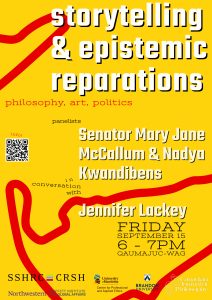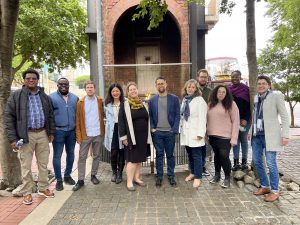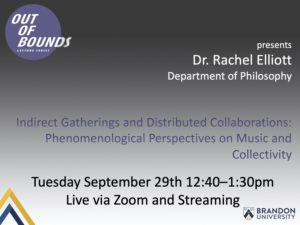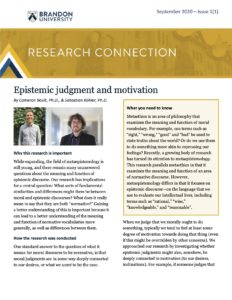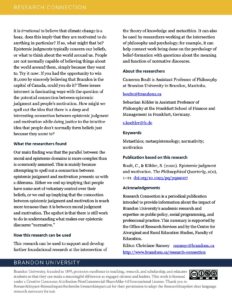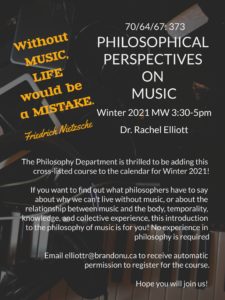BU Philosophy News
Mosaic Paint Night Part 2!
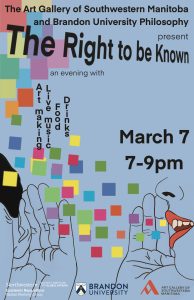
BU Philosophy is hosting a second mosaic creation night celebrating the “right to be known” with Winnipeg-based artist Bruno de Oliveira Jayme.
This FREE event takes place at the Art Gallery of Southwestern Manitoba, and continues the mosaic we started creating with over 250 participants at the Canadian Museum for Human Rights this past September. All are welcome!
Enjoy snacks, refreshments and live music by TAJ.
Where: ART GALLERY OF SOUTHWESTERN MANITOBA
When: 7-9pm, FRIDAY MARCH 7
What: free PAINT NIGHT visually exploring philosophical and personal perspectives on the “right to be known”
More details on the project can be found here! Stay tuned! Hope to see many of you there!
Book launch! Wed, Oct 23 @4:30 in the Library Gathering Space
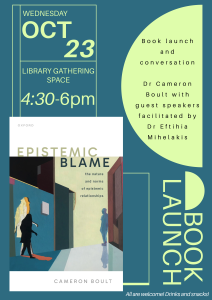
All are welcome to the official BU book launch of Dr. Cameron Boult’s newly published book Epistemic Blame (Oxford University Press, 2024). Dr. Boult will introduce themes from the book and will be joined by Dr. Nick Nicola (SSHRC Postdoctoral Fellow, BU) and Prof. Lorraine Mayer (Native Studies) in brief panel discussion facilitated by Dr. Efihia Mihelakis (French and Francophone Studies/GWS). Free drinks and snacks!
The Right to Be Known – Free Paint Night at CMHR – Sept 10, 2024!

This event is part of BU Philosophy’s ongoing collaboration with the Epistemic Reparations Global Working Group.
Free food and music! Register here!
SSHRC Postdoctoral Fellow – 2024-26
BU Philosophy i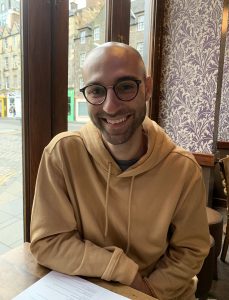 s very excited to announce that Dr Nick Nicola (U of Toronto/U of Miami) will be joining the Department as a 2-year SSHRC Postdoctoral Fellow! Starting October 2024, Dr Nicola will be working with Dr Cameron Boult on a project titled “Epistemic Blame and the Practice of Blame Avoidance”.
s very excited to announce that Dr Nick Nicola (U of Toronto/U of Miami) will be joining the Department as a 2-year SSHRC Postdoctoral Fellow! Starting October 2024, Dr Nicola will be working with Dr Cameron Boult on a project titled “Epistemic Blame and the Practice of Blame Avoidance”.
More details to follow! Stay tuned for research outputs and events around this project!
Free Public Philosophy Event! September 2023
Where: WAG-Qaumajuc, Ilipvik Learning Steps
When: Friday, Sept 15, 6-7pm
Visit here for more details! Facebook event page here!
CfA: Epistemic Blame and Epistemic Reparations
The Philosophy Department will be hosting the next instalment of the Epistemic Wrongs, Blame, and Reparations workshop series, in Winnipeg this September! Please consider submitting an abstract!
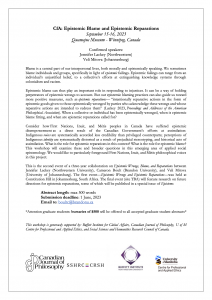
Epistemic Wrongs and Epistemic Reparations
On Nov 3-5, 2022, BU Philosophy collaborated with members of the African Centre for Epistemology and Philosophy of Science (ACEPS) in an international workshop on Epistemic Wrongs and Epistemic Reparations. The workshop took place on Constitution Hill, in Johannesburg. Check out more details here. This is the first of a multi-event series, in collaboration with ACEPS and Jennifer Lackey. The next event will take place in Manitoba, in September 2023 – stay tuned for more details!
BU Philosophy Researcher Awarded SSHRC Insight Development Grant (2022-2024) – $28,975
BU Philosophy is excited to announce that Dr. Cameron Boult (Associate Professor and Chair) has been awarded a two-year SSHRC Insight Development Grant ($28, 975) for a project titled “Norms of Epistemic Criticism”.

The project examines normative questions about our practice of epistemic blame and criticism. The project aims to:
i) Develop the first detailed account of degrees of epistemic criticizability, and examine how such an account can illuminate questions about when epistemic criticism is a fitting response.
ii) Further explore standing to epistemically blame, specifically with a focus on complicity and hypocrisy in the epistemic domain.
iii) Examine connections between epistemic blame and social power, including:
- how social power can problematically exclude groups from our (epistemic) blaming practices.
- how unjust balances in social power can generate obligations on groups to reflect on, and perhaps modify, their (epistemic) blaming practices.
This part of the project will develop the groundwork for a major collaboration with members of the African Centre for Epistemology and Philosophy of Science, University of Johannesburg – the team will explore obstacles that epistemic phenomena, such as testimonial injustice, and epistemic blame, pose in processes of reconciliation in Canada and South Africa.
Research Manitoba News
2022 Keenan Prize
Philosophy Awarded BURC New Faculty Research Grant – $7,390
March, 2021 – Dr. Rachel Elliott (Assistant Professor, Philososphy) has been awarded a BURC New Faculty Research Grant ($7,390) for her project titled “Intercorporeality Online: Re-evaluating the Role of Embodiment in Web-Based Acts of Musical Empathy”. Here is a summary of the project from Dr. Elliott:
“A number of important collective processes—like musical production and understanding, collective intentionality, and empathy—are thought to ineluctably include embodiment. It is unclear, however, whether the embodiment thought to be required of such processes is possible in online contexts. My research aims to define the ways in which processes of embodiment can occur online, so as to bridge a gap between the extant body of literature on embodied cognition and the increasing demand to perform group cognitive activities online, a context in which prima facie, everyday modes of embodiment do not automatically apply.
My project has two aims:
 1) To re-assess the degree to which in-person, embodied, interaction is required to behold others empathetically; and
1) To re-assess the degree to which in-person, embodied, interaction is required to behold others empathetically; and
2) To re-consider the characterization of online spaces as disembodied.
I’m seeking to answer these questions using Merleau-Ponty’s notions of body schema. The body schema is arguably what underlies our empathetic capabilities, and, it is known that musical practices are particularly good at foregrounding body schemas. Therefore, the ways that musicians are attempting to bring the body schema online may serve to illuminate the functioning of embodiment in our online interactions. I will thus be proceeding by collecting raw phenomenological data through original interviews with individuals musicking in online spaces as well as first-hand observations and other archival activities. In seeking to determine the extent to which results of interdisciplinary research on embodied cognition apply in online contexts – like Zoom meetings, distributed musical performances, chats, streaming services, and podcasts – I hope to be able to contribute the insights currently needed by practitioners such as musicians, teachers, arts-based researchers as they increasingly operate online.”
Philosophy Awarded BURC – SSHRC Research Grant – $5,000
March, 2021 – Dr. Cameron Boult (Chair, Philosophy) has been awarded a BURC SSHRC Research Grant ($5,000) for his project titled “Blame for Testimonial Injustice”. Testimonial injustice occurs when a speaker suffers a credibility deficit as a result of the effect that prejudicial stereotyping has had on the hearer’s uptake of their testimony. It is a distinctively “epistemic” kin d of injustice: by suffering a credibility deficit, the speaker is wronged in their capacity as a knower. Testimonial injustice is rapidly becoming one of the most prominent topics at the intersection of social and feminist epistemology. While much has been written about the mechanisms of testimonial injustice and the specific harms it causes, there is currently no extensive examination of what constitutes a fitting reaction to instances of testimonial injustice. This project aims to fill this gap. It will do so by examining connections between testimonial injustice and the underexplored concept of “epistemic blame”. It will examine whether and why perpetrators of testimonial injustice may be fitting targets of epistemic blame, perhaps in addition to other kinds of blame.
d of injustice: by suffering a credibility deficit, the speaker is wronged in their capacity as a knower. Testimonial injustice is rapidly becoming one of the most prominent topics at the intersection of social and feminist epistemology. While much has been written about the mechanisms of testimonial injustice and the specific harms it causes, there is currently no extensive examination of what constitutes a fitting reaction to instances of testimonial injustice. This project aims to fill this gap. It will do so by examining connections between testimonial injustice and the underexplored concept of “epistemic blame”. It will examine whether and why perpetrators of testimonial injustice may be fitting targets of epistemic blame, perhaps in addition to other kinds of blame.
Brian Keenan Prize 2021
 Value: one-time cash prize of $1500
Value: one-time cash prize of $1500
Deadline: May 31, 2021 (prizewinner will be announced on October 1, 2021)
Eligibility: awarded to an undergraduate student attending a Canadian university or college.
The Dr. Brian M. Keenan Prize is a national scholarship founded to first, honour Dr. Brian Keenan’s life-long commitment to philosophical education and to second, motivate and support post-secondary philosophic inquiry. Brian Keenan served as a professor of Philosophy at the University of Winnipeg for 37 years, from 1972 – 2009. In his time there he inspired countless students to engage critically with the world around them and to see the outworking of philosophical theories in practical life.
This past year, the Keenan Prize shortlist continued to include applicants from across the country and the 2020 prize was awarded to Sophia Whicher for her paper “Legal Positivism and a Dynamic Picture of the Law“. The prize will be awarded again this year to a candidate who submits a paper in the area of Philosophy of History, Law, or Social and Political Philosophy.
http://www.keenanprize.com/wp
BU Student Philosophy Association – NOW ONLINE!
Philosophy Majors Brittney McNamee and Bryston Langlois are spearheading the first ever BU Student Philosophy Association. This is a place for all students at BU who have an interest in philosophy to join in online conversations, learn about funding opportunities, philosophical events and undergraduate journals, and basically just be in the loop when it comes to philosophy at BU and beyond. You don’t need to be a philosophy Major or Minor to be a part! Visit the website for details and to join.
Dr. Rachel Elliott on the British Society for Phenomenology Podcast!
Our very own Dr. Rachel Elliott (Assistant Professor, Philosophy) recently presented a talk entitled ‘”We”: A Merleau-Pontian Account of Group Temporality and Improvised Music’ at the 2020 Annual Conference of the British Society for Phemomenology. The talk is now a podcast on Season 5 of the BSP’s podcast series.
Click here to check it out!
Out of Bounds Lecture Series – Sept 28, 2020 @ 12:40
BU Research Connection Sept 2020
Check out some of the latest research being done in the Philosophy Department in the September 2020 edition of the BU Research Connection
https://www.brandonu.ca/research-connection/rc-article/1158/
New Course in Winter 2021 – Philosophical Perspectives on Music
The Philosophy Department is thrilled to be adding this cross-listed course to the calendar for Winter 2021!
If you want to find out what philosophers have to say about why we can’t live without music, or about the relationship between music and the body, temporality, knowledge, and collective experience, this introduction to the philosophy of music is for you! No experience in philosophy is required
Email elliottr@brandonu.ca to receive automatic permission to register for the course.
BURC – New Faculty Research Grant: Health in Ecological Systems – $7,431
June, 2019 – Dr. Andrew Inkpen (Assistant Professor, Philosophy) was awarded a BURC New Faculty Research Grant, funding a two-year project at the intersection of philosophy of science, ecology, sustainability, and health studies ($7,431). This research project will culminate in a book manuscript tentatively titled Ecosystem Health and Well-Being, co-authored with Dr. C. Tyler DesRoches (Assistant Professor of Sustainability and Human Well-Being at the School of Sustainability, Arizona State University). The book will critically review recent literature about ecological function, ecosystem health, and ecosystem well-being. These concepts are central to current scientific, medical, and environmental discourse, but their application faces three challenges: (1) they are applied in disparate and imprecise ways, resulting in a confusing and unfocused literature; (2) there is no agreed upon metaphysical foundation of ecosystem health or well-being, thus there is no standard for how they ought to be applied; and (3) these first two problems are compounded by the fact that health and well-being are concepts that have the potential to motivate action in public health and conservation policy. Given these problems, the book will offer a framework to help us evaluate when uses of ecological function, ecosystem health, and ecosystem well-being are appropriate and how we can recognize when this language is improperly applied, as when it is exploited for its emotional content under the guise of scientific impartiality.
Research Manitoba – New Investigator Operating Grant: Blame and Belief – $17,1850
June, 2019 – Dr. Cameron Boult was awarded a Research Manitoba New Investigator Operating Grant (2019-2021) for his project Blame and Belief ($17,850). This project will culminate in a book manuscript examining the nature and norms of “epistemic blame”. Blame is a central part of our moral and practical lives. Negative emotional responses, reproach, and demands for apology are all typical features of our blaming practices. We are most familiar with the idea of blaming people for their actions. Increasingly, research in the philosophical theory of knowledge—or epistemology—has turned its attention to the ways we blame one another for our beliefs. In addition to one’s actions, a person can be the target of negative emotional responses, reproach, and possibly even demands for apology for their beliefs, or intellectual conduct more broadly. For example, we sometimes blame others for engaging in biased thinking, or believing in the absence of sufficient evidence. In epistemology, this is known as epistemic blame. What exactly is epistemic blame? Is it a species of moral blame, or is it something distinctive? What is the relationship between blame for action and blame for belief? The book will develop a new account of epistemic blame, with the aim of answering these questions. Project funding will support the hiring of two student research assistants over the course of two years. It will also support a major research visit at the COGITO Glasgow Epistemology Group, University of Glasgow (UK), forging links between the BU Philosophy Department and Philosophy at Glasgow University.
First Annual BU Philosophy Workshop – Riding Mountain, MB
March, 2019 – The Philosophy Department held its first annual Philosophy Workshop at Riding Mountain National Park. The workshop brought together six researchers for a day of presenting and sharing feedback on research work in progress. Stay tuned for details about next year’s workshop!
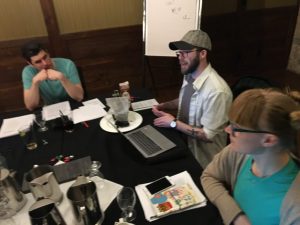
Fabien-Denis Cayer explains a subtle point about Plato’s lesser-known dialogue, Clitophon.
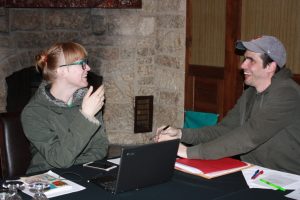
Dr. Hanemaayer and Dr. Inkpen discuss the lighter side of philosophy of medicine.
| Presentation | Researcher |
|---|---|
| Clitophon and the Success of Philosophy | Fabien-Denis Cayer (U of Ottawa) |
| Automated Judgements: Historicizing AI in Biomedicine | Ariane Hanemaayer (BU, Sociology) |
| Health, Ecology, and The Microbiome | S. Andrew Inkpen (BU, Philosophy) |
| Analyzing Impermanence | Tyler D. P. Brunet (Cambridge) |
| Pragmatism, Truth, and Cognitive Agency | Cameron Boult (BU, Philosophy) |
| Russellian Completeness and the Axiom of Uniplicity | F. Adam Sopuck (BU, Philosophy) |
Philosophy Reading Group 2018-2019
Fall, 2018 – The Philosophy Department formed the Philosophy Reading Group. The group meets once every two weeks during term time. Members discuss papers in a wide range of topics in philosophy! This year we read papers in philosophy of biology, philosophy of medicine, epistemology, philosophy of perception, and social theory. Paper topic selection is determined by the interests of the members of the group.
The reading group will be up and running again in Fall 2019! Please email Dr. Cameron Boult at boultc@brandonu.ca if you’d like more details!

